

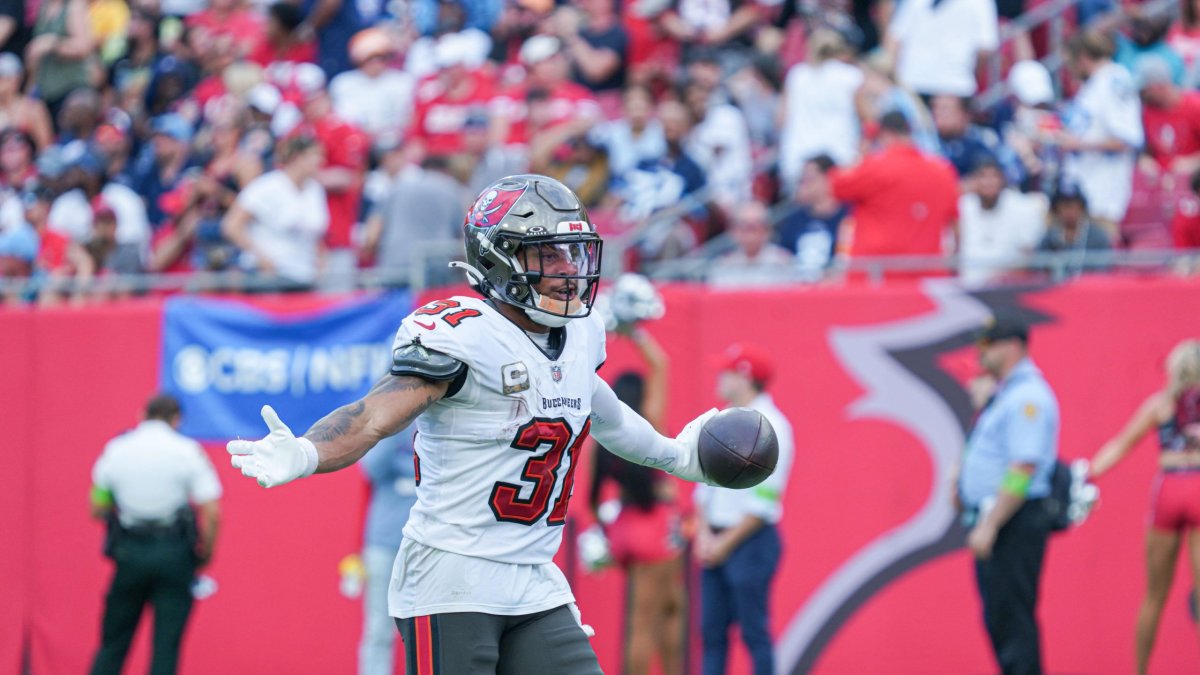
• The NFL’s highest-paid safety is also the league’s best: Antoine Winfield Jr. signed a four-year, $84.1 million deal this offseason and comes in at No. 1 in these rankings.
• Kyle Hamilton and Jessie Bates III round out the top three: Hamilton has proven to be a versatile chess piece for the Ravens, while Bates thrived as a ballhawk in his first year as a Falcon.
• Get a head start on fantasy football: Use PFF’s fantasy football mock draft simulator to create real live mock draft simulations to get ready for your live draft!
Estimated Reading Time: 11 minutes
Continuing our series highlighting the top players in the NFL at every position heading into the 2024 season, here are the top 32 safeties in the league.
This ranking features only safeties who are currently on a roster, so players such as Justin Simmons and Tashaun Gipson Sr. were not considered.
QB | RB | WR | TE | OT | DI | EDGE | LB
Winfield, who became the NFL’s highest-paid defensive back this offseason, was the highest-graded safety in the league last season (90.7).
The 25-year-old’s 92.0 PFF overall grade over the past three seasons leads the position, and his run-defense and pass-rush grades rank first among safeties, too.
Hamilton was the NFL’s highest-graded safety as a rookie in 2022 (87.6), and he nearly replicated that in his second season, earning an 86.4 PFF overall grade.
While Hamilton led all safeties in pass-rush grade and was the only player at the position to earn pass-rush and coverage grades over 90.0 in 2023, he could stand to improve in run defense, which keeps him out of this list’s top spot.
Arguably the best free-agent addition of the 2023 offseason, Bates returned to his 2020 form in his first season in Atlanta. He earned a career-high 90.6 PFF overall grade, surpassing his 2020 mark of 90.1.
Bates’ six interceptions ranked second among safeties in 2023, and he was the only player at the position to place in the top three in both run-defense and coverage grades.
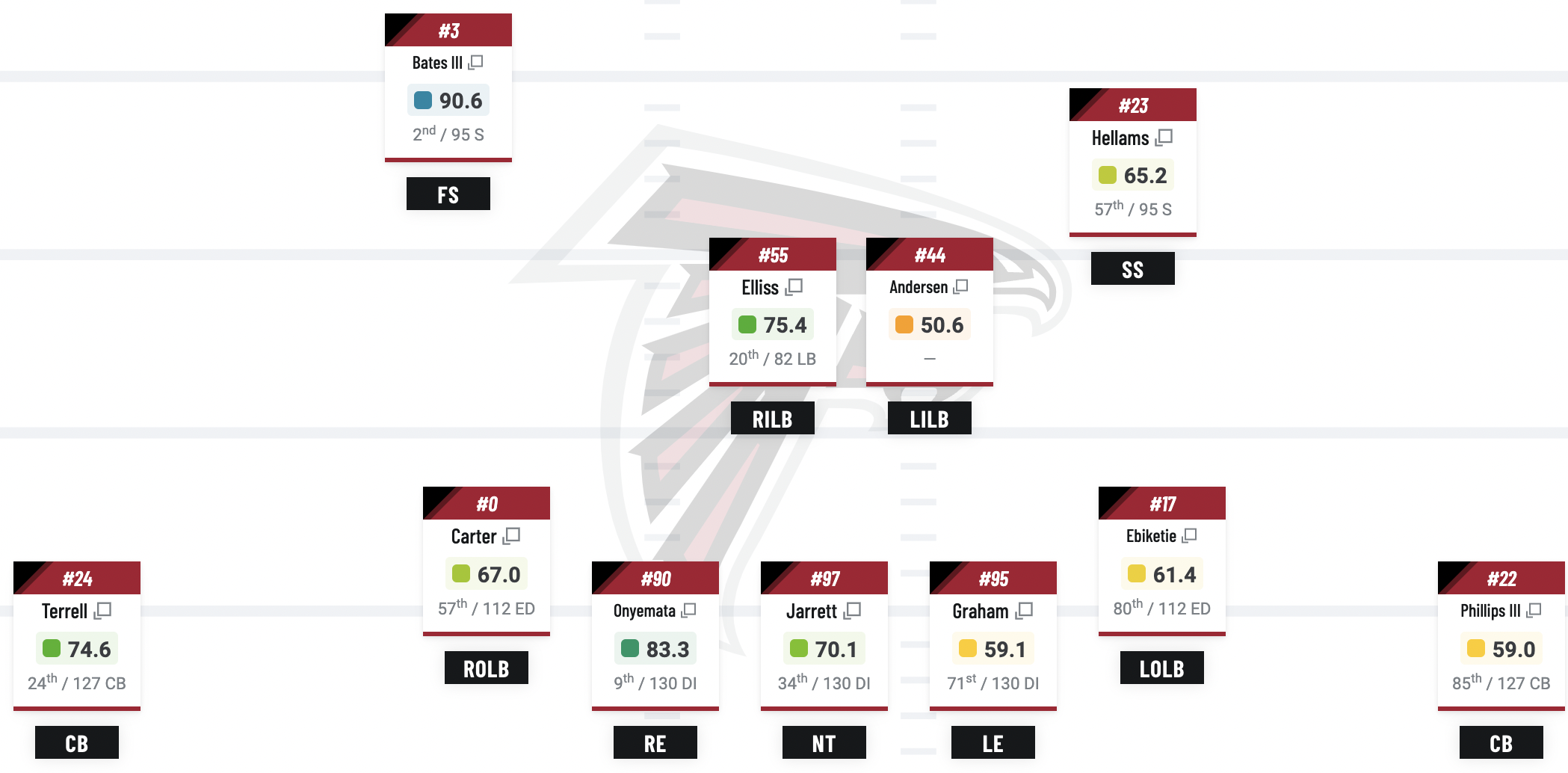
Injuries in 2023 slowed Fitzpatrick, who missed multiple games and had a down year overall.
While his run-defense grade still finished above 80.0, Fitzpatrick earned a coverage grade below 70.0 for just the second time in the past five seasons while logging a career-low 625 snaps, including the postseason.
After playing at least 999 snaps in all five of his seasons with the Saints, Williams has failed to log more than 800 snaps in either of his first two years in Baltimore. But when he is on the field, he is still among the best safeties in the league, especially in coverage.
Williams’ 76.4 PFF coverage grade in 2023 ranked 16th among safeties, and he places sixth among 94 qualifying safeties in coverage grade (92.5) since entering the league in 2017.
Although he recorded a career-low 707 snaps due to injuries, Holland was playing his best football in what could be considered a breakout season for the Oregon product. His 90.4 PFF overall grade ranked third among safeties.
Holland played only 434 coverage snaps, but his three forced fumbles following receptions led the position.
While the talent is obviously there, James couldn’t put it all together last season, which prevents him from being mentioned here in the top tier of safeties.
The Chargers safety topped 1,000 snaps for the first time since 2018 despite missing one game. But while he ranked third among safeties in PFF overall grade (90.4) between 2018 and 2022, his 60.1 grade in 2023 was good for just 71st at the position.
McKinney had a breakout 2023 season, recording a career-high 87.5 PFF overall grade that ranked fourth among safeties. And it came in a contract year. He subsequently cashed in with the Packers on a four-year, $67 million deal.
The former New York Giant played a full season for just the second time in his four years in the NFL, and he made the most of it, ranking first among safeties in PFF coverage grade (91.2). McKinney allowed a 52.3 passer rating in coverage, tied for the fourth-lowest mark at the position, and he was the most targeted safety to not allow a touchdown all season.
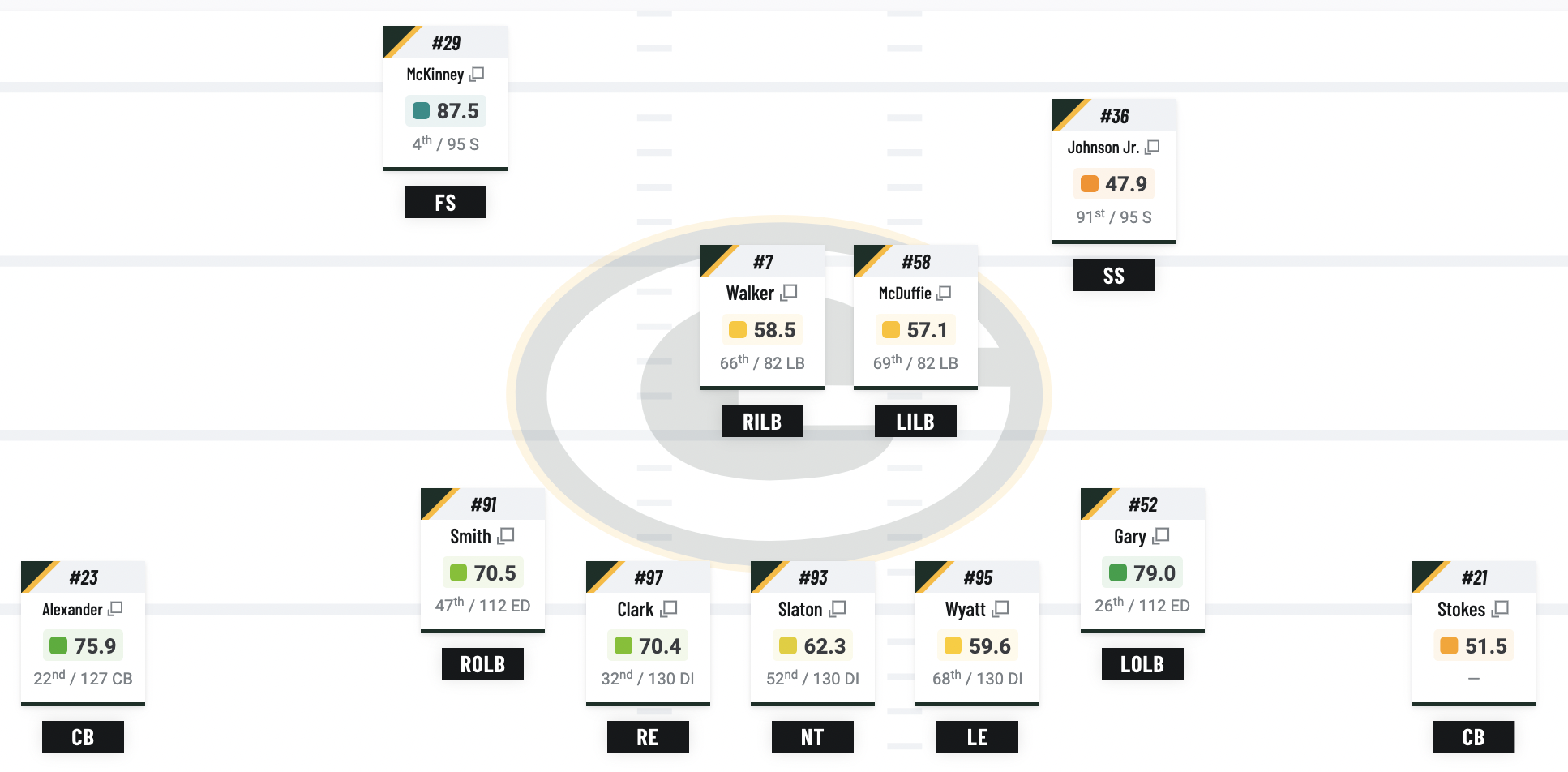
Dugger, who signed a four-year contract after being franchise-tagged earlier this offseason, played a career-high 1,116 snaps in 2023, but it was his lowest-graded season due to some coverage struggles. He earned a career-low 50.0 coverage grade after earning 73.0-plus marks in back-to-back seasons. Dugger somewhat made up for it with a career-high 79.6 run-defense grade, though.
Although he turned 32 in May, Mathieu is still playing at a high level and might just be playing the best football of his Saints tenure. He earned an 80.0-plus PFF overall grade in back-to-back seasons for the first time in his career, and as a result, his 86.9 overall grade over the past two years ranks fifth among safeties.
Mathieu has also been among the most durable safeties in the league, logging more than 1,000 snaps in seven consecutive seasons.
Peppers completely revived his career over the past two seasons in New England. His 91.6 PFF run-defense grade with the Patriots ranks second among safeties, behind only Antoine Winfield Jr., while his 83.1 coverage grade over the past two years ranks 12th.
However, durability remains an issue for Peppers. Even though he played a career-high number of snaps in 2023, he still missed two games and has yet to play more than 1,000 snaps in a season.
Byard, who logged at least 1,000 snaps for the seventh straight season, has shown some signs of decline but is still among the best safeties in the league.
His 91.9 PFF overall grade since entering the league is tied for the best mark at the position, while his run-defense grade ranks second — behind only Antoine Winfield Jr.
Following a breakout 2022 season, Hufanga had his 2023 campaign cut short due to injury. However, he still nearly matched his interception total of four from 2022 by picking off three passes across nearly half as many snaps.
Hufanga also gave up just one touchdown compared to the six he allowed in 2022 and, as a result, allowed a career-low 72.9 passer rating into his coverage.
Baker had a down year by all measures, playing his fewest snaps since his rookie season, earning the lowest PFF overall grade of his career and recording sub-70.0 run-defense and coverage grades. However, he remains one of the league’s top safeties against the run, as his 89.7 run-defense grade since 2017 ranks ninth at the position.
Hooker has been a different player in Dallas compared to his time in Indianapolis. He has already played more snaps in three seasons with the Cowboys than in four years with the Colts, and while he earned a PFF overall grade over 70.0 only once in Indianapolis, he has graded above 70.0 in all three years in Dallas.
As a result, Hooker’s 82.0 overall grade over the past three seasons ranks 10th among safeties.
At 35 years old, Smith, who is arguably the best safety of the past 10 seasons, might not be the player he once was, but he still plays at a high level.
Across the first eight weeks of the 2023 season, he ranked 17th both in PFF overall grade and coverage grade. He allowed just 8.3 yards per reception in 2023, the fifth-lowest mark among safeties.
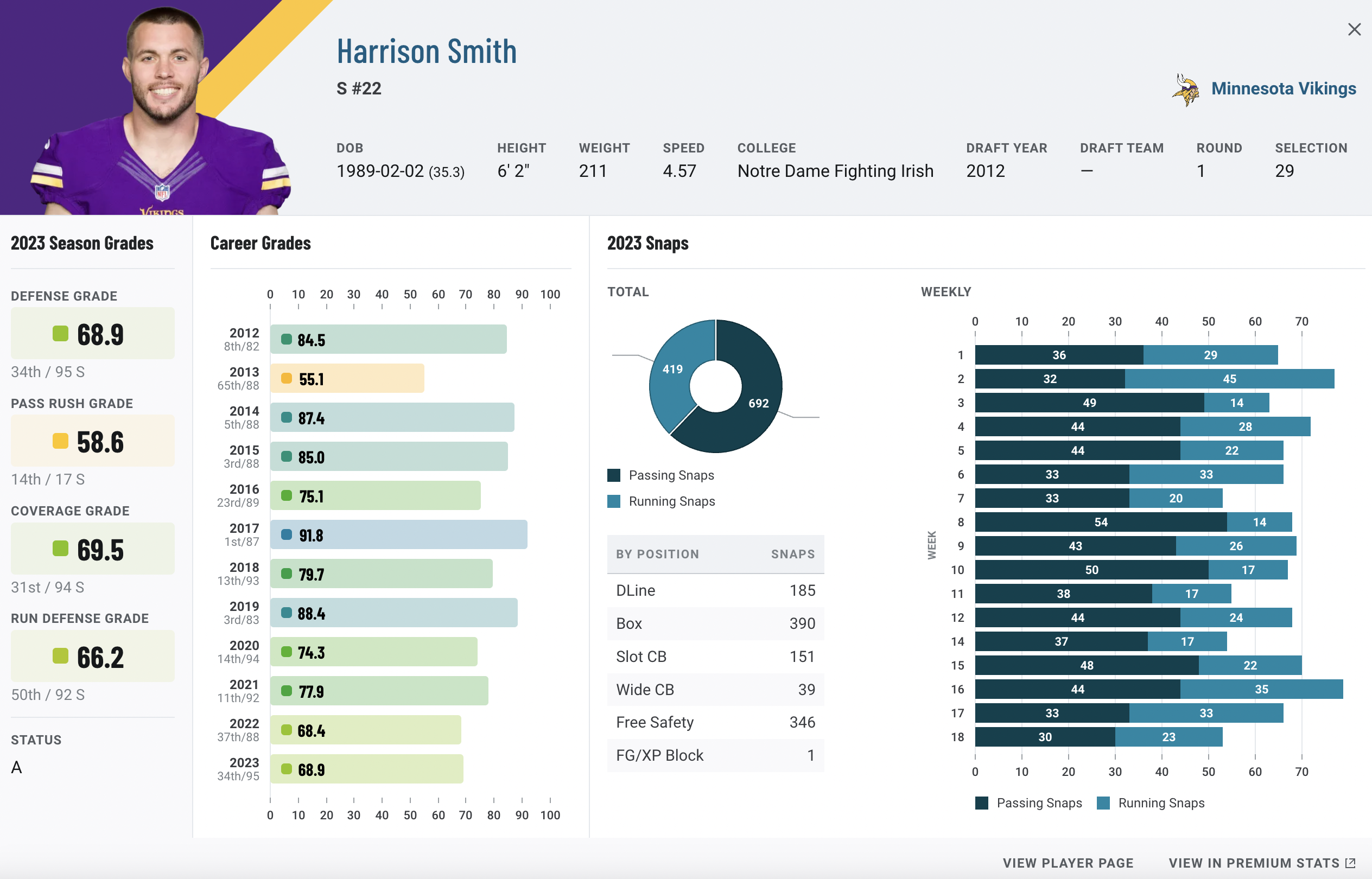
Blankenship built on his promising rookie campaign while playing a more substantial role in his second season, logging nearly 1,000 snaps and also facing injuries. He improved in coverage, forcing nine incomplete passes on top of his three interceptions. That helped him earn a 78.0 PFF coverage grade, which ranked 13th among safeties.
Gilman had a breakout season in a contract year, which led to a new two-year deal with the Chargers this offseason. Despite missing three games with an injury, Gilman forced eight incompletions — on top of his two interceptions — on the season, which was tied for the third most among safeties. His 89.2 PFF coverage grade also ranked fourth at the position last season.
Metellus flashed ability on his way to an 85.1 PFF overall grade in 2022 in a limited role, but 2023 represented a new challenge. It was the first time that Metellus logged more than 300 snaps, and he immediately topped 1,000. He did not disappoint in an increased role, as he was among the NFL’s more versatile safeties and led the position with 116 pass-rush snaps. He was one of just five safeties to earn coverage, pass-rush and run-defense grades all above 64.0.
Stone made the most of a heavier workload in 2023. He put together an impressive season in which he led all safeties with seven interceptions and earned an 85.3 PFF coverage grade that ranked seventh at the position.
However, Stone ranked on the other end of the spectrum against the run, as his 34.2 run-defense grade placed last among 92 qualifying safeties.
Although Curl had a breakout 2022 season in which he posted a second-ranked 82.9 PFF overall grade, he couldn’t replicate that performance in 2023, as his 66.6 mark ranked just 50th. But since entering the league, Curl still ranks 17th among safeties in overall grade (78.0) and 19th in coverage grade (83.7).
Although Delpit once again faced injuries, cutting short his 2023 campaign, it was the LSU product’s best season in the NFL so far.
He began the year with back-to-back 90.0-plus PFF game grades and was PFF’s 11th-highest-graded safety after Week 9 (77.7). His performance tailed off a bit and his season ended early, but he still finished as the 31st-ranked safety in PFF overall grade.
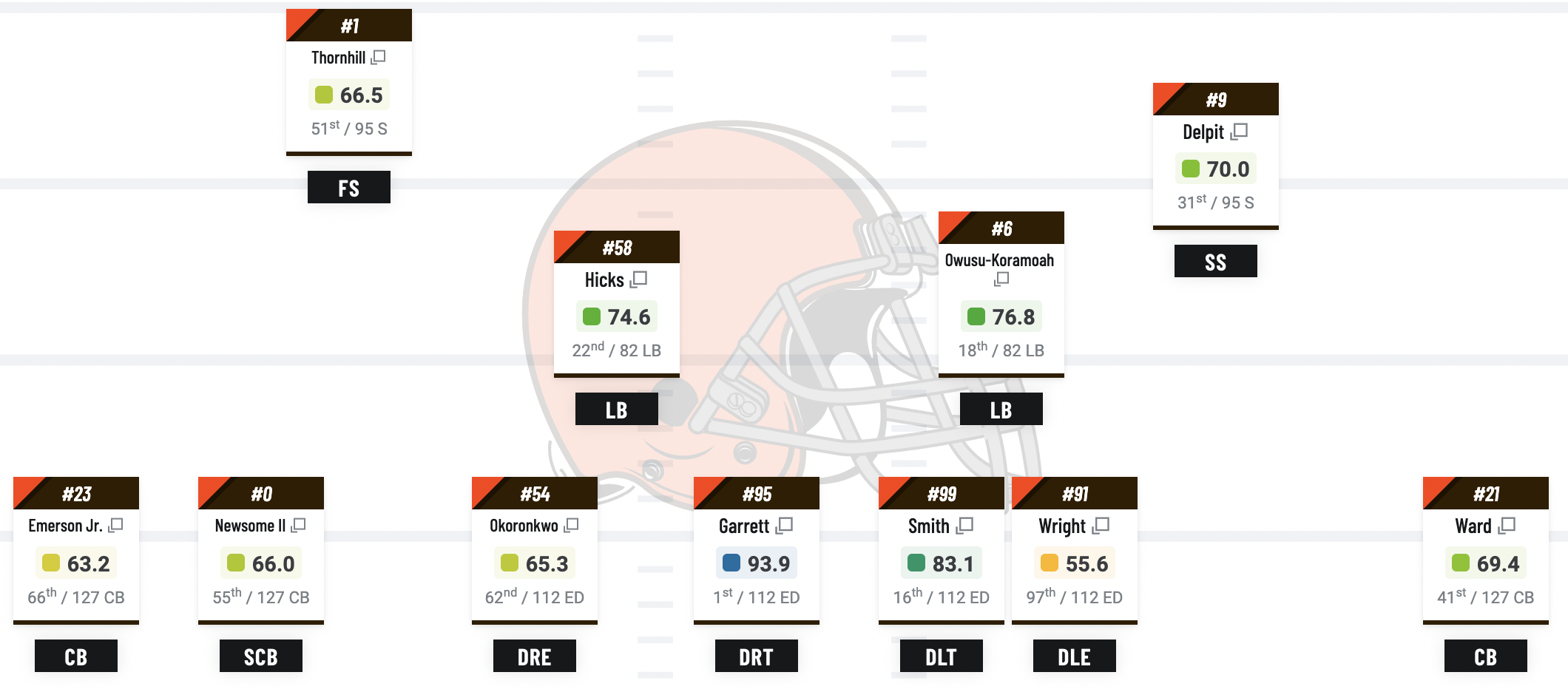
After a sophomore slump, Moehrig earned a PFF overall grade above 70.0 for the second time in three seasons in 2023. While he finished in the top 35 both in coverage and run-defense grades, his end-of-season form was even more impressive. From Weeks 16 to 18, Moehrig’s 83.3 overall grade ranked sixth among safeties.
Ward’s first season in Houston did not go as planned. His 506 snaps were his fewest over the past five seasons, the result of his missing multiple games due to injuries. In addition, his 68.4 PFF overall grade was his lowest since 2018.
In the four seasons leading up to 2023, however, Ward earned an 89.9 overall grade, which ranked fourth among safeties.
Although he went through a sophomore slump in his first full season as a starter in 2022, Bynum bounced back and finished 2023 as the 22nd-ranked safety in PFF grade.
Bynum’s 85.7 overall grade after the first 14 weeks ranked fourth at the position. He also tied for the most forced incompletions over the season (nine) and could have had an even better season if he capitalized on a league-leading three dropped interceptions.
Thompson missed two games due to injuries and failed to log at least 1,000 snaps for the first time since 2020, but he played very well in 2023 and earned a career-high 71.3 PFF overall grade that ranked 27th among safeties. He allowed a 71.7 passer rating into his coverage, the 15th-best mark at the position.
Woods, despite playing his fewest snaps in a season (795) since his rookie year, had an excellent year on his way to a career-best 80.3 PFF overall grade, which ranked 12th among safeties.
The Louisiana Tech product did not allow a touchdown in coverage all season and, as a result, let up a low 49.9 passer rating into his coverage — the fourth-best mark among 76 qualifying safeties.
Love’s first season with the Seahawks could not have gone much better, as he recorded career highs in PFF overall grade (72.8) and PFF coverage grade (80.4). His coverage grade ranked 11th among safeties in 2023, and his four interceptions tied for the third most at the position.
There is still some room for Love to improve as a run defender, as he earned a sub-60.0 run-defense grade for the fourth straight season.
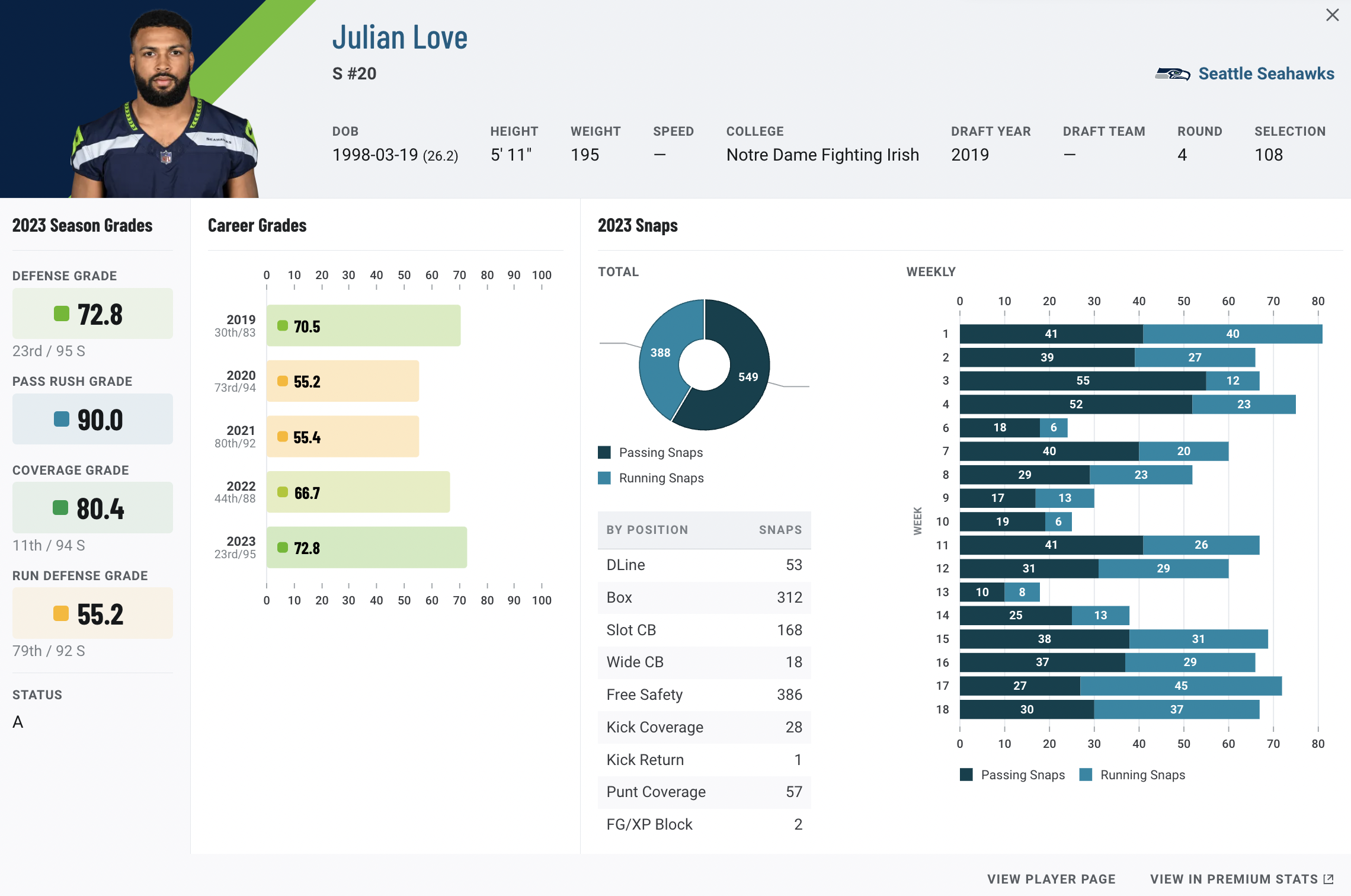
Battle initially played a limited role as a rookie for the Bengals in 2023 but then earned the starting job and did not look back. His 82.5 PFF overall grade ranked eighth among safeties, and he was one of just five safeties to earn a 75.0-plus grade in both run defense and coverage.
Battle’s 81.3 run-defense grade ranked third among all rookie safeties over the past four seasons, behind only the first two players on this list: Antoine Winfield Jr. and Kyle Hamilton.
Cisco remains a very consistent player, having earned PFF overall grades between 67.0 and 69.0 in all three of his NFL seasons. However, he showed some improvements in coverage and earned a career-high 71.5 coverage grade in 2023 on the back of four interceptions.
While his new teammate Andre Cisco has been very consistent, Savage has not. The former first-round pick had a breakout 2020 season and ranked 17th among safeties in PFF overall grade, but he then earned overall grades below 60.0 in back-to-back seasons and was PFF’s 87th-ranked safety in 2022.
Savage revived his career in his last season in Green Bay, as his 75.5 overall grade was a career-high mark and ranked 15th at the position.
Bell’s lone year with the Carolina Panthers did not go well, as he played a career-low 777 snaps and his 63.9 PFF overall grade was his lowest since his rookie season, mainly due to a career-low 59.8 run-defense grade.
Bell now returns to Cincinnati after ranking among the top 35 safeties in all three of his previous seasons with the Bengals.